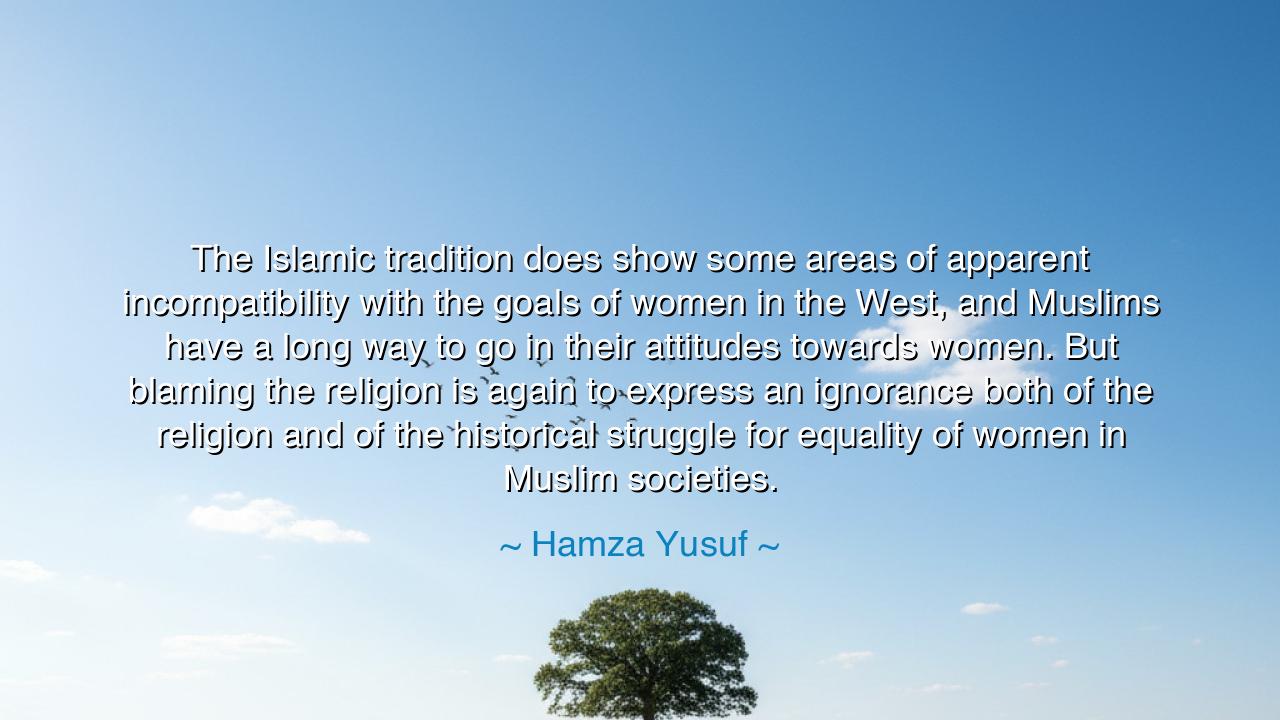
The Islamic tradition does show some areas of apparent
The Islamic tradition does show some areas of apparent incompatibility with the goals of women in the West, and Muslims have a long way to go in their attitudes towards women. But blaming the religion is again to express an ignorance both of the religion and of the historical struggle for equality of women in Muslim societies.






“The Islamic tradition does show some areas of apparent incompatibility with the goals of women in the West, and Muslims have a long way to go in their attitudes towards women. But blaming the religion is again to express an ignorance both of the religion and of the historical struggle for equality of women in Muslim societies.” — Hamza Yusuf
In these measured and profound words, Hamza Yusuf speaks not as one defending religion blindly, but as a scholar urging humanity toward deeper understanding. His message pierces through the noise of prejudice and assumption, calling us to see that the issue of women’s equality within Islam cannot be reduced to a single narrative of oppression or progress. He acknowledges the truth — that in many Muslim communities, attitudes toward women remain bound by custom, culture, and historical stagnation. Yet, he warns that to blame the religion itself is to misunderstand both its origins and its spirit. His statement reminds us that true wisdom does not condemn hastily; it seeks the roots of things before passing judgment.
From the earliest days of Islam, the Qur’an and the teachings of the Prophet Muhammad (peace be upon him) brought forth ideas that were revolutionary in their time. Women were given rights to inheritance, education, and property — at an age when most of the world still saw them as possessions rather than persons. The Prophet’s own wife, Khadijah, was a merchant of great wealth and influence, and his daughter Fatimah became a symbol of piety and strength. These examples were not anomalies, but ideals — proof that within the Islamic tradition lies a foundation of dignity for women. The problem, as Hamza Yusuf implies, is not the faith itself, but how generations have interpreted it through the fog of politics, patriarchy, and cultural inertia.
History bears witness to both the glory and the regression of this truth. There were times when Muslim societies led the world in scholarship, medicine, and philosophy — and women stood among those ranks. Fatima al-Fihri, for example, founded the world’s oldest university in Fez, Morocco, in the ninth century. Yet centuries later, as colonialism fractured empires and local traditions hardened into dogma, the light dimmed. What once was a civilization of learning became divided by poverty, pride, and fear. It is these historical wounds — not the essence of Islam — that have delayed the fuller realization of equality.
Hamza Yusuf’s words call for balance, for justice in thought. The West, too, has its own long road toward equality. The struggles of women there — for suffrage, for workplace rights, for autonomy — were not gifts freely given by men, but victories wrested through centuries of resistance. To measure Islam only by its modern failures, while forgetting the West’s own long battle, is to commit the sin of arrogance. Both civilizations, East and West, have faltered and risen in the treatment of women. Both are still learning that equality is not granted by law alone, but by the transformation of hearts and minds.
When Yusuf says that blaming the religion is ignorance, he is urging us to look deeper — to distinguish between divine principles and human corruption. Religion, in its purest form, is like a river springing from the mountain: clear, pure, and life-giving. But as it flows through the lands of men, it gathers the sediments of culture, custom, and misunderstanding. To condemn the water for the mud is to miss the truth that the source remains pure. Thus, the task of every generation is to cleanse the channels — to return to the mercy, the justice, and the wisdom that lie at the heart of faith.
The lesson, then, is twofold. To those within Muslim societies, Yusuf’s words are a call to renewal — to revive the early spirit of Islam, which honored women not as second to men, but as equal partners in purpose and piety. And to those outside, his words are a call to humility — to recognize that the story of another people cannot be understood through prejudice or headlines. The work of progress is not to mock, but to understand; not to condemn, but to build.
So let this be the teaching carried forward: seek understanding before judgment, and truth before triumph. The wisdom of the ancients and the message of every true faith agree — that oppression is not divine, but human, and that the path to equality lies in mercy, patience, and reform. When we look at one another not as strangers of creed, but as companions in the same struggle toward justice, the walls between civilizations begin to crumble. In that moment, the words of Hamza Yusuf become prophecy fulfilled — not of division, but of awakening, where knowledge replaces ignorance, and understanding replaces fear.






AAdministratorAdministrator
Welcome, honored guests. Please leave a comment, we will respond soon